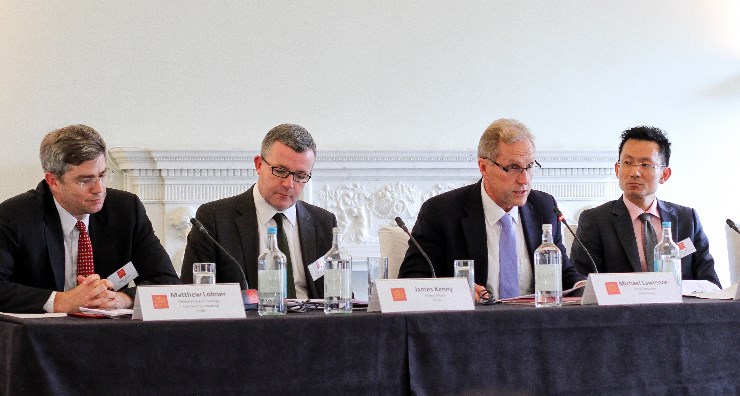Driving commercial and political engagement between Asia, the Middle East and Europe
Driving commercial and political engagement between Asia, the Middle East and Europe
Driving commercial and political engagement between Asia, the Middle East and Europe

A host of top names joined Asia House for a two-day event that centred on the continuing process of economic integration within the Association of Southeast Asian Nations (ASEAN) and the opportunities this process brings to UK business.
ASEAN Deputy Secretary-General, Dr Lim Hong Hin, and Tom Dodd, Head of the ASEAN Department at the Foreign & Commonwealth Office, offered introductory remarks before panels consisting of representatives from IHS, University of Leeds, Standard Chartered Bank, Harvey Nash, Singapore Economic Development Board, Arup and HSBC convened to discuss the future of the ASEAN Economic Community (AEC) and opportunities for capturing trade and investment in the region.
In a discussion led by Asia House CEO, Michael Lawrence, HE Dr Lim shared his views on the ASEAN Economic Community (AEC). Dr Lim agreed that there was a lot more to do before the AEC was implemented in 2015. One of the biggest challenges to the AEC is that a lot has been agreed to at the regional level but not all initiatives have been implemented at the national level. However, Dr Lim remained optimistic about the AEC, saying that “the train has left the station, and we will make sure that it arrives at its destination by 2015.” Read all of HE Dr. Lim Hong Hin’s speech here.
The Deputy Secretary-General’s positive remarks were tested by Omar Hamid, Senior Manager, Asia Country Risk at IHS, who warned that progress on the AEC will be incremental due to the need for consensus, large economic disparity between member states and potential political instabilities. Hamid questioned if the pace of ASEAN growth would remain the same.
Christopher Dent, Professor of East Asia’s International Political Economy at the University of Leeds argued that ASEAN is the most comprehensive, coherent international agreement when compared to other emerging regional markets of the world. Professor Dent saw opportunities for more regional collaboration, especially on green growth, climate change and renewables. He concluded that ASEAN must include its periphery in order to continue its development.
Standard Chartered economist, Jinny Yan highlighted the 3 ‘Ds’ that drive competitiveness in ASEAN: diversity, demographics and domestic demand. The economies of ASEAN are made up of diverse levels of economic development, with Laos and Singapore on different ends of the economic development spectrum. Demographically, ASEAN member states generally have very young populations. Finally, she argued that domestic demand in Southeast Asia has kept the region resilient during the economic downturn.
‘ASEAN: an El Dorado of business?’
Dodd opened the second panel by saying that “peace and security are the prerequisites for growth.” He noted that the movement towards free and integrated markets was welcome news for UK business; UK exports to ASEAN will be greater than that to India and Japan. Dodd said that one of the best opportunities for UK business in the ASEAN region was in the education sector, pointing out that English was the lingua franca of the ASEAN Secretariat.
The CEO of Harvey Nash, Albert Ellis, spoke of the benefits of working in Vietnam. With 80% of graduates studying maths and sciences and having a high level of literacy, Ellis was keen to underline the value provided by the Vietnamese workforce. Kian-Teik Beh, International Director (Europe), Singapore Economic Development Board, promoted English-speaking Singapore as a “springboard” into the ASEAN market. Beh said that the development of the AEC will take some time, but warned that UK investors shouldn’t wait too long -they may lose out on their competitive advantage. James Kenny, Global Affairs at Arup echoed these sentiments saying that the time was ripe to invest in the region: Arup has recently re-entered the Indonesian market, though he warned that governance and compliance were still issues to be aware of.
Finally, Matthew Lobner, Global Head of Strategy for Commercial Banking at HSBC, looked at the macro trends in the region, namely the growing middle class. He believed that this demographic would determine how UK companies, like Tesco, operate in the ASEAN market. Lobner also noted that there is increasing outbound investment from the region into the UK market.
The conference was followed by a reception, where Asia House Chairman, Sir John Boyd, introduced the guest of honour, HE Dr Lim. Corporate members and guests enjoyed networking with British and Asian business leaders, embassy officials and government representatives.
The ASEAN Opportunity Conference was part of a two-day event, as part of a larger Asia House focus upon the regional association. July 11 saw a Breakfast Briefing with HE Dr Lim Hong Hin answering questions from Asia House members and guests. This was followed by an panel discussion organised by Asia House, Reform, and Prudential, entitled: ‘Asia and the UK: Partnering for prosperity’. Dr Lim spoke alongside fellow panellists the Rt Hon Hugo Swire MP, Minister of State at the Foreign & Commonwealth Office, and Marjut Hannonen, a Member of the Cabinet of EU Trade Commissioner Karel de Gucht. Miles Celic, Director of Group Public Affairs and Policy at Prudential moderated the discussion. Both events were held under the Chatham House Rule.
